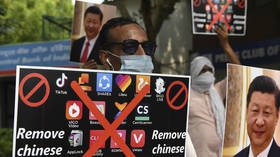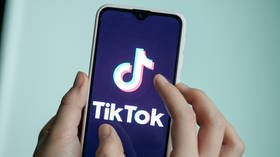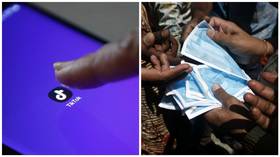Why India’s TikTok ban could help establish it as a major player in the tech world… and cause big problems for the Chinese

As relations between the two countries deteriorate, India has banned 59 Chinese apps, amid concerns over misuse of users’ private data. Could the move set a template for other nations to follow?
Amid rising tensions between India and China over the recent border confrontation and subsequent military build-up, the Indian government has banned 59 Chinese apps, including top social-media platforms such as TikTok, Helo and WeChat, citing threats they pose to the country’s “sovereignty and security.”
Specifically, there have been reports of misuse of users’ private data by certain apps, which transmitted the data to servers outside India, including to the Chinese government – claims TikTok has strongly denied.
A government statement said that the “mining and profiling” of data by elements hostile to national security, and safeguarding the privacy of 1.3 billion Indians were taken very seriously, and required “emergency measures.” While arguments have been raised on the legality of the move under international trade laws, experts believe that such measures are permissible since national security is difficult to challenge in a court of law.
Beyond the recent tensions with China, Prime Minister Narendra Modi has been trying to revive domestic manufacturing to make India self-reliant in a post-Covid world, exhorting all Indians to “lend their support in making India self-reliant and become vocal for local as a way to serve the country.” India’s economic ties with China run deep, and even though the authorities have been looking at ways to reduce the country’s dependence on Chinese imports, reducing that reliance won’t be easy. India’s imports from China range from electronics to essential drug ingredients to industrial machinery, and bilateral trade reached almost $70 billion in 2019, with a trade deficit of about $50 billion – much higher than with any other trading partner.
But, given the belligerent mood in New Delhi, drastic measures against China such as this ban have been expected. The larger question, though, is whether or not the Indian IT industry is geared up to provide suitable alternate apps to fulfil the needs of the Indian market, or if American apps will prove more popular.
Chinese companies that have long relied on the huge Indian consumer market for their global popularity in the Google Play Store and Apple App Store are worried that this ban could adversely impact their valuations and more significantly, lead to other states following suit. Already, the United States Federal Communications Commission has designated two Chinese telecom giants, Huawei Technologies Co and ZTE Corp, as “national security threats.” And Denmark’s data watchdog has opened an investigation into the Chinese app TikTok to determine whether it is complying with European Union’s General Data Protection Regulation. Depending on how these investigations proceed, other countries in Europe could be compelled to ban Chinese apps.
The response within India to the ban and calls for a greater focus to “Make in India” from the government has been very encouraging. A senior academic from one of India’s leading technical institutions stated, “Our technical innovation is second to none in the world,” promising that Indians would soon have better “innovative replacement apps built by Indians for Indians.”
Indeed, within days of the ban on the Chinese apps, an Indian app Chingari, an alternative to TikTok – which has nearly 119 million active users in India and is among the top 10 apps on both the Google Play Store and Apple App Store – had attracted more than 10 million downloads from the Google store. Another alternative, Roposo, developed by three Indian engineers, is also doing well.
The ban imposed by the government is unlikely to be revoked, given the political tensions between the two countries, and the mood in New Delhi. There’s therefore no choice for the Indian tech industry but to develop replacements for all the banned apps. Nonetheless, based on its recent successes, it seems the sector is up to the challenge. Perhaps this ultimatum by the government was what was required to really establish India as a major player in this corner of the tech market.
The statements, views and opinions expressed in this column are solely those of the author and do not necessarily represent those of RT.

















